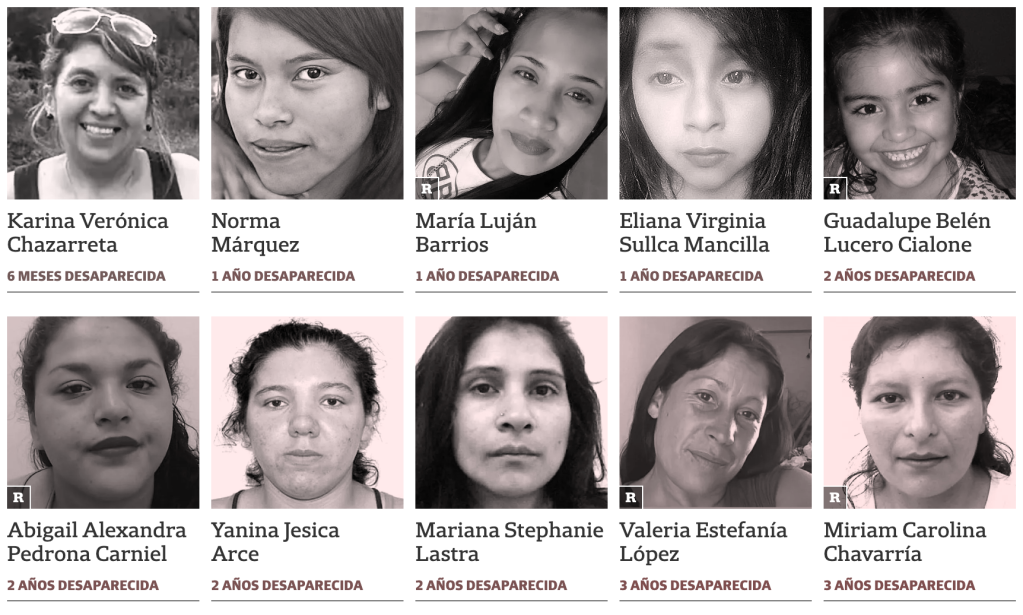
On March 8 2023, International Women’s Day, La Nación published an ambitious project, calling attention to the disappearance of more than 5,000 women over the course of three decades. The project included reconstructing the history of 60 of those women, who had been missing anywhere from two months to 33 years when the pieces were published. The organization also posted two stories juxtaposing examples of Argentine authorities taking little action and swift action in response to disappearances, drawing a stark contrast between failure and possibility. Additional stories and explainers were subsequently published.
“We aimed to shed light on their stories, lifting them out of anonymity so that their relatives could, for the first time, voice their pain and demand for justice.”
The project was honored in the 2023 Online Journalism Awards as the winner of the Knight Award for Public Service. The award recognizes compelling storytelling on a specific community issue that motivates the audience to take action. We caught up with the La Nación team to learn more about how this project became reality.
For several years, the Community section team, responsible for the winning project, has been publishing brief updates or content on social media regarding missing persons wanted nationwide. Our aim has always been to encourage our audience to engage with social causes and help amplify the search efforts.
Within this framework, journalist Lorena Oliva, who spearheaded the primary research, began pondering over the personal narratives of these missing individuals and their families. She noticed that only a select few cases, such as Marita Verón or Maria Cash, received media coverage.
This led to a series of questions: Who are these missing individuals? How did they disappear? Is anyone actively searching for them? Initial inquiries revealed that, particularly concerning women, many were sought by authorities without a gender-sensitive approach from the Justice system or the Ministry of Security.
Consequently, the idea of embarking on a special project for March 8, International Women’s Day, emerged. Our primary goal from the outset was to address the fundamental question: Is the state genuinely invested in finding them? Additionally, we aimed to shed light on their stories, lifting them out of anonymity so that their relatives could, for the first time, voice their pain and demand for justice. We recognized that by doing so, we could bolster search efforts and create conditions to ensure ongoing investment of time and resources into addressing this tragic issue.
The project brought together a diverse array of talents: journalists, editors, photographers, programmers, designers, data analysts, social media managers, camerapersons and audiovisual producers. However, it also welcomed individuals with profiles not traditionally found in newsrooms: product managers, user experience experts and those responsible for forging partnerships with civil society organizations.
We integrated a person who worked in alliance with the NGO engaged in the search for missing persons and children. We infused the project with a series of content pieces tailored for social media. These pieces were specifically crafted to engage citizens in the quest for missing individuals, embodying a service-oriented and utility-driven approach.
In collaboration with seasoned user experience professionals, we made the strategic decision to host the main story of the series within a single URL, despite the wealth of information it encompassed — including texts, photos and audio clips. This feat was made possible by incorporating interactive buttons that empower readers to toggle between displayed and concealed content according to their preferences. Additionally, each narrative focusing on the stories of the missing women can be easily shared individually across various social media platforms.
We take great pride in the invaluable insights unearthed by the project, shedding light on previously undisclosed information and thrusting the subject into the spotlight of media discourse. This also sets a helpful benchmark for future research on this social problem.
In this line, we recognize the imperative of scrutinizing the true extent of the state’s investment in the search for missing persons. While this was initially part of our agenda, we opted to postpone it due to the inherent complexities involved.
The achievement brought immense satisfaction for several compelling reasons. It served as a profound morale boost for our entire team, validating our collective efforts and inspiring us to persevere in our pursuit of excellence in journalism. Winning an ONA award, a prestigious global distinction, not only acknowledges our dedication but also elevates the standing of LA NACION as a journalistic brand on the international stage.
For a team like ours, which invested nearly four months of intensive work into the project, such recognition is profoundly gratifying. It underscores the significance of prioritizing quality and service journalism within our organization. Moreover, this accolade provides invaluable encouragement, reinforcing our commitment to tackling pressing social issues that demand rigorous research, time and resources.
Winning this award empowers us to forge ahead, emboldened in our mission to shed light on critical issues and drive meaningful change through journalism.
Explore more OJA-winning work: Reaching Spanish-speaking audiences through grassroots strategies
We’d like to highlight three remarkable projects that have captivated our attention recently.
Firstly, we commend The Pudding (USA) for their insightful investigation titled On Upward Mobility. This piece exposes how one’s birth neighborhood can significantly influence their economic prospects. What sets this project apart is its visually engaging narrative, with the author incorporating personal experiences to illuminate the issue.
Another noteworthy endeavor is the interactive special published by The New York Times (USA) last year, titled “What’s Homelessness Really Like?” This simple yet impactful concept involves journalists engaging in conversations with 30 individuals experiencing homelessness. Through these dialogues, the audience gains insight into the primary factors contributing to homelessness, the initial experiences of those affected and the support networks available to them, among other aspects.
Despite being over a year old, we found La Capital’s (Argentina) research on families supporting incarcerated individuals to be highly compelling. Their report, “Las Visitantes: Historias de Mujeres que Cuidan a los Presos” (The Visitors: Stories of Women Who Care for Prisoners), offers profound insights into the experiences of women and their children affected by having a loved one in prison. The project stands out for its narrative richness, engaging data visualizations and compassionate portrayal of these women, complemented by expert perspectives. Remarkably, all this content is seamlessly integrated within a single URL.
These projects serve as inspiring examples of the power of journalism to shed light on complex societal issues, spark meaningful conversations and foster empathy and understanding among audiences.
Launched in 2000, the Online Journalism Awards are the only comprehensive set of journalism prizes honoring excellence and innovation in digital journalism around the world. The call for entries for the 2024 awards will be open April 4–May 9.
Explore the 2023 winners and finalists Volunteer with the OJAsThe Online Journalism Awards™ (OJAs), launched in May 2000, are the only comprehensive set of journalism prizes honoring excellence in digital journalism around the world.

Posted By
Karolle Rabarison
Categories
Stories